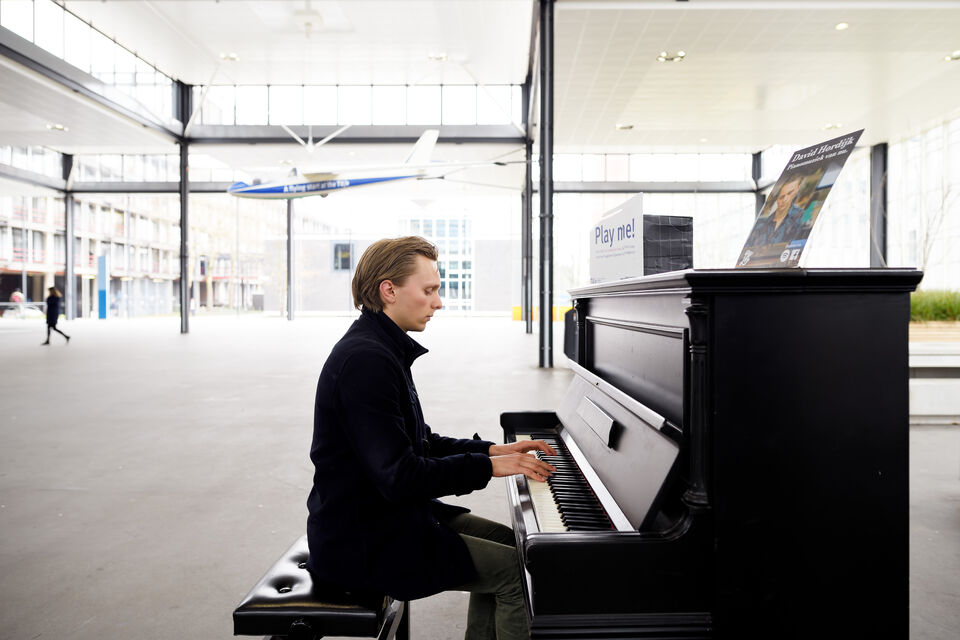Piano music as “counterweight to the turbulent time which we live in”
Even in the middle of the night, somewhat intoxicated after going out at Stratumseind, he has sat in front of the piano in TU/e's market hall. “Here I was, improvising in my own little world for about half an hour." Also after a long evening of studying for interim examinations, and after having been kicked out from MetaForum at closing time, David Hordijk lays his hands on the piano keys every once in a while. The Bachelor’s student is the organiser of Piano Day @TU/e, Thursday at MetaForum.
As a child, he regularly played the piano at his home; he started taking classes when he was eight. There was an instant connection between young David and the piano - not least thanks to the enthusiasm of his teacher, Paul Chatrou. "We did have a book from which we worked, but he also quickly introduced me to, for example, blues and jazz. Partly because of this, I immediately felt very free while playing. You can lose yourself in the piano."
Did he literally and figuratively always have it in his fingertips? The 22-year-old feels this a difficult question: "People are always eager to talk about talent, but in my eyes, you mainly become good by playing a lot. And you only do that if you really have a passion for something". And that passion was there immediately. "There were times that I practiced the same bar every day for an entire week. Playing the piano is not just a pastime. To me, it mostly feels like I’m developing myself."
When he was about fourteen or fifteen, the musical fire was dimmed for a while. "I was just a slacking adolescent, I didn’t go to class as often as I did before and also regularly skipped school. But I did always continue to play the piano and afterwards, I became even more passionate about it. That is also when I started playing more difficult and classical pieces, and started writing pieces myself. "
Organic
For Hordijk, it is almost like an organic process, without any steering plans or intentions. "When I am improvising and writing, it always feels as if things simply happen - not as if I am doing something actively or consciously." Nor does he have a clear story in his head in advance that he wants to tell through his music. "But I did always incorporate my own emotions into it, consciously or unconsciously." This includes his frustrations about the ongoing chaos at home, growing up in a family with a single mother who had to take care of five children (listen to his piece 'Unfold').
A year ago, under his own management, the pianist released his first album, spurred on by an enthusiastic friend. In the meantime, along with one of his three brothers, Hordijk was living in his second student dorm where there was space for a piano. "Before that, I had spent a year without a piano. It felt like a desert without an oasis.”
No piece of paper
His first album is called “Touch” and was released when he was 21 years old. A big and exciting step: "It takes a while before you dare to say to the world: ‘I think this is good, you should listen to this’. On top of that, I don’t have any certificates or diplomas for what I do, I didn’t go to a conservatory. People can really only judge my music on the basis of how it sounds.”
However, according to him, he has only received "warm comments" about his album. On Spotify, “Touch” has just over two hundred monthly listeners, "that number is slowly increasing". A second album is in the making, and Hordijk can also be booked as a pianist for performances.
"Piano music of now", is how the TU/e student, who is currently working on finishing his Bachelor’s in Sustainable Innovation, describes his style. Mostly quiet music, by the way, "as a kind of counterweight to the turbulent times in which we live in general, but also specifically here at the TU/e. Everyone is extremely ambitious. We have very high standards for ourselves here in Eindhoven. The curriculum is already quite challenging and, in addition, people want to do a board year, be active in a student team, start an entrepreneurship, etc. That's really intense.”
He himself finds little peace in listening to his own songs, "I have heard every single note that has been brought into the world by me. However, similar music does work for me, for example when I am studying.” Furthermore, to Hordijk, the piano means above all: love, "the feeling that you are not alone. It's hard to explain, but it gives meaning to my life. I don’t play piano to achieve something or to move forward in life, playing the piano is in itself already the goal.”
Tonight, Wednesday 28 March, David Hordijk can be seen and heard in the Blauwe Zaal during the free-access event “Earth Hour” of Technology for Global Development and Tint. Tomorrow, on international Piano Day (the 88th day of the year in honour of the 88-keyed instrument), Hordijk can be found in front of and around the piano at the market hall pretty much the whole day. Everyone is invited to come play or listen. Footloose dancers will be there too and will improvise based on the music being played.


Discussion